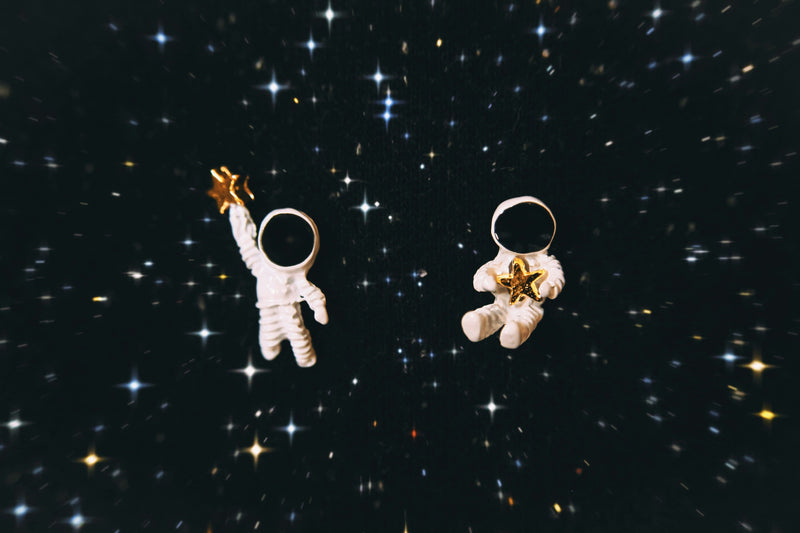
Blast Off to Wonder: Why Exploring Space Ignites Young Minds and Shapes Future Explorers 🚀✨
Picture this: A six-year-old lies on a blanket in the backyard, gazing up at the star-filled sky. "How far away are those stars?" she whispers to her parent. "Could there be other kids on planets looking back at us?" In that moment of cosmic curiosity, something magical happens—her mind expands beyond the boundaries of Earth, and she begins to see herself as part of something infinitely vast and wonderfully mysterious. That spark of wonder about space isn't just childhood imagination—it's the beginning of scientific thinking that could shape her entire approach to learning and discovery. 🌌👧
The Universe as the Ultimate Classroom 🏫🌟
Space exploration offers children something extraordinary: a learning adventure that naturally combines science, technology, engineering, mathematics, and even art into one awe-inspiring package. When kids learn about space, they're not just memorizing facts about planets—they're developing critical thinking skills that will serve them throughout their lives.
Research shows that children who engage with astronomy and space science demonstrate remarkable benefits:
- Enhanced problem-solving and logical reasoning abilities 🧩🔍
- Improved mathematical understanding through real-world applications 📊✨
- Greater appreciation for scientific methodology and evidence-based thinking 🔬📚
- Increased environmental awareness and perspective on Earth's uniqueness 🌍💚
- Stronger creativity and imagination skills 🎨🌈
The Curiosity Mindset Journal provides structured activities that channel children's natural wonder about the cosmos into deeper learning experiences. 📔🔭
Why Space Captivates Young Minds (And Why That Matters) 🧠💫
There's something uniquely powerful about space that captures children's imagination in ways that few other subjects can match. Understanding why helps us harness this natural fascination for learning:
The Scale Factor: Space helps children grasp concepts of size, distance, and time that stretch their thinking beyond everyday experiences 📏🌌
The Mystery Element: Unlike many school subjects, space still holds countless unknowns, making every child a potential discoverer 🔍❓
The Adventure Appeal: Space exploration feels like the ultimate adventure story—real-life heroes venturing into the unknown 🦸♀️🚀
The Future Connection: Space represents possibilities and dreams, helping children envision their role in tomorrow's world 🔮✨
The Beauty Factor: Images from space telescopes and missions provide visual wonder that engages children on an emotional level 📸🎨
The stories in the My Furry Soulmates series can spark similar wonder and curiosity about exploration and discovery through engaging animal characters who model courage and scientific thinking. 📚🦊
Building Future Innovators: The STEM Connection 🔬🛠️
Space exploration naturally integrates all STEM fields in ways that make abstract concepts concrete and exciting:
Science in Action 🧪
- Physics: Understanding gravity, motion, and energy through rocket launches 🚀
- Chemistry: Learning about the composition of planets and stars ⭐
- Biology: Exploring the possibility of life beyond Earth 👽🌱
- Earth Science: Comparing our planet to others in the solar system 🌍
Technology That Inspires 💻
- Robotics: Mars rovers as examples of remote exploration 🤖
- Communications: How we send messages across millions of miles 📡
- Navigation: GPS systems and space-based positioning 🗺️
Engineering Challenges 🏗️
- Spacecraft design: What makes rockets work? 🚀
- Problem-solving: How astronauts fix things in space 🔧
- Safety systems: Protecting humans in harsh environments 🛡️
Mathematics Made Meaningful 📊
- Geometry: Understanding orbits and planetary movements 🔄
- Measurement: Distances that boggle the mind 📏
- Time: How long does it take to reach Mars? ⏰
The Confident Mindset Journal helps children build the persistence and problem-solving confidence essential for tackling these complex STEM concepts. 📔💪
Age-Appropriate Space Adventures 🌟👶👧🧒
Different ages bring different capacities for understanding space concepts, but wonder can begin remarkably early:
Preschoolers (Ages 3-5) 🌙
- Moon phases and why the moon "follows" the car 🌕🚗
- Sun safety and why we need our star ☀️🕶️
- Counting planets and learning their names 🪐🔢
- Simple rocket building with blocks or paper 🧱📄
Early Elementary (Ages 6-8) 🌍
- Day and night cycles and Earth's rotation 🌅🌃
- Seasons and Earth's orbit around the Sun 🍂🌸
- Comparing planets: hot, cold, big, small 🔥❄️
- Introduction to astronauts and space missions 👨🚀👩🚀
Middle Elementary (Ages 9-11) 🪐
- Solar system formation and asteroid belts ☄️
- Constellations and navigation by stars 🧭✨
- Space technology and how it helps us on Earth 📱🛰️
- The search for exoplanets and potential life 🔍🌍
The Kindness Mindset Journal can help children develop the collaboration and communication skills essential for the teamwork that space exploration requires. 📔🤝
Practical Space Learning Adventures 🛸🏠
Bringing space into your child's learning doesn't require a rocket ship! Here are engaging ways to explore the cosmos from your own home:
Backyard Astronomy 🌌
- Moon observation journals tracking phases 📝🌙
- Constellation hunts with simple star maps 🗺️⭐
- Planet spotting with binoculars 🔭🪐
- Solar eclipse viewing (safely!) ☀️🌑
Kitchen Space Science 🍽️
- Baking "planet cookies" to learn relative sizes 🍪📏
- Demonstrating gravity with dropping objects 🍎⬇️
- Creating "comet tails" with dry ice (adult supervision) ☄️❄️
- Modeling craters using flour and marbles 🌙⚫
Creative Space Projects 🎨
- Building solar system models with everyday materials 🏗️🪐
- Writing letters to astronauts on the International Space Station ✍️👨🚀
- Creating space-themed art inspired by telescope images 🎨🌌
- Designing spacecraft for imaginary missions ✏️🚀
Technology Integration 💻
- Virtual reality tours of Mars and the Moon 🥽🌍
- Space simulation games and apps 📱🎮
- Live streams from the International Space Station 📹🛰️
- NASA's website resources designed for kids 🌐👶
The Curiosity Mindset Journal provides prompts that help children document and reflect on these discoveries, deepening their scientific thinking skills. 🔍📝
The Perspective Gift: Earth from Space 🌍💝
One of the most profound gifts that space exploration offers children is perspective. When kids learn about the vastness of space, they begin to understand Earth's unique position as our "pale blue dot" in the cosmic ocean.
This perspective naturally develops:
- Environmental consciousness and stewardship 🌱♻️
- Appreciation for Earth's interconnected systems 🌊🌪️
- Understanding of global citizenship and unity 🤝🌍
- Respect for the rarity and preciousness of life 🦋❤️
Children who understand that Earth is our only home in a vast, mostly empty universe often become passionate advocates for protecting our planet. They grasp viscerally that we're all fellow travelers on "Spaceship Earth." 🚀🌍
Inspiring the Next Generation of Explorers 👨🚀👩🚀
Today's children will live through humanity's expansion into the solar system. Some may become the first humans to walk on Mars, design settlements on the Moon, or discover life beyond Earth. But even those who choose other paths will benefit from the thinking skills, wonder, and perspective that space exploration provides.
Career possibilities sparked by early space interest:
- Aerospace engineering and spacecraft design 🛠️🚀
- Astronomy and astrophysics research 🔭⭐
- Planetary geology and astrobiology 🪨👽
- Mission control and space operations 📡🖥️
- Science communication and education 📚🗣️
- Environmental science and sustainability 🌱🔬
The Confident Mindset Journal helps children build the resilience and growth mindset essential for pursuing ambitious goals like space exploration careers. 📔🌟
Fostering Wonder While Building Skills 🌈🧠
The key to successful space education lies in balancing wonder with skill-building. Children need both the emotional engagement that comes from awe and the practical skills that come from hands-on learning:
Nurture Wonder Through:
- Sharing breathtaking images from space missions 📸✨
- Reading stories of space exploration adventures 📚🚀
- Visiting planetariums and science museums 🏛️🌌
- Connecting space learning to children's natural curiosity 🤔❓
Build Skills Through:
- Hands-on experiments and projects 🔬👐
- Mathematical calculations using space examples 📊🧮
- Critical thinking about space exploration challenges 💭🧩
- Communication activities sharing space discoveries 🗣️📢
Using tools like the Curiosity Mindset Journal, Confident Mindset Journal, and Kindness Mindset Journal helps children develop the curiosity, confidence, and collaboration skills essential for lifelong scientific exploration. 📔🌟
Starting Your Space Journey Today 🚀👣
Ready to launch your child's space exploration adventure? Here are simple ways to begin:
- Start with questions: "What do you wonder about space?" 💭❓
- Look up together: Even city lights can't hide the Moon and bright planets 🌙⭐
- Share age-appropriate space documentaries or shows 📺🌌
- Create a space learning journal using the Curiosity Mindset Journal 📝🔭
- Try simple space-themed activities or experiments 🧪🪐
- Connect space learning to everyday experiences (satellites, weather, GPS) 📱🌦️
- Celebrate discoveries and questions, not just right answers 🎉🤔
Join Our Cosmic Conversation! 💬🌌
How have you sparked space curiosity in the children in your life? What activities or resources have captured their imagination? Share your stellar experiences in the comments below!
Remember: When we open children's minds to the wonders of space, we're not just teaching them about distant worlds—we're helping them develop the curiosity, critical thinking, and sense of wonder that will serve them throughout their lives. In a universe full of mysteries waiting to be solved, there may be no greater gift we can offer than helping children see themselves as explorers, questioners, and discoverers capable of reaching for the stars. ✨🌟



0 comments